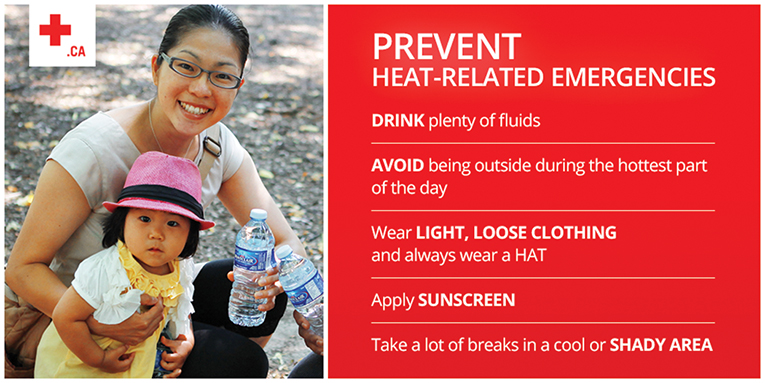Keep Cool and Carry On: Manage summer heat waves
Posted on June 3, 2021 by Maple Creek
Canadian Red Cross
It seems like the snow just melted and we’re already preparing for our first heat wave of the season. With some scorchers on the horizon, now is a good time for a reminder on how to stay cool and what to watch for in case of overexposure to heat.
“Drink plenty of water,” says Andrea Wilkie, Canadian Red Cross spokesperson. “It sounds obvious, but when you are out having fun in the sun for a couple of hours, you can lose track of how hydrated you are and run into trouble before you know it. And don’t forget about Fido! Pets need water and shade as well.”
So be prepared. Before you head out for the day, check weather reports for heat warnings. Slather on sunscreen as sunburned skin loses the ability to cool itself.
More tips to help you stay safe during hot weather.
• Avoid being outdoors during the middle of the day. Instead, try going out in the early morning or later evening hours when the sun is not as strong. Where possible, try to spend the hottest hours of the day in an air-conditioned environment.
• Slow down activities that increase your body temperature. Work, exercise, and play in brief periods and take frequent breaks in a cool or shaded area.
• Dress in light, loose clothing. Wear a hat and sunglasses.
Heat-related emergencies include heat cramps, heat exhaustion and heat stroke. Children, the elderly, and those with certain health conditions are particularly susceptible, but these emergencies can happen to anyone who stays in the summer heat for too long.
• HEAT CRAMPS
o mild muscle contractions that can become severe, usually in the legs or abdomen
o moist skin
• HEAT EXHAUSTION
o moist skin
o skin that is redder or paler than normal
o nausea
o dizziness and weakness
o exhaustion
• HEATSTROKE
o high body temperature
o red, hot, dry skin
o irritable, bizarre, or aggressive behaviour
o progressive loss of consciousness
o rapid, weak pulse becoming irregular
o rapid, shallow breathing
o seizures
“Heat-related emergencies are progressive in nature and can get rapidly worse without proper treatment,” says Wilkie. “Anyone demonstrating signs of heat overexposure should be moved to a cool location, given cool water to sip, and cool compresses to apply to the skin. Call 9-1-1 for anyone showing significant signs of distress, losing consciousness or whose symptoms are becoming more severe.”
For more information on keeping your summer safe and enjoyable, head to redcross.ca.


Leave a Reply
You must be logged in to post a comment.